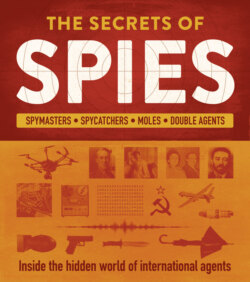Читать книгу The Secrets of Spies - Weldon Owen - Страница 7
На сайте Литреса книга снята с продажи.
Оглавление8
In this book, we hope to reveal some of the secrets
of spying, and how and why spies go about their clandestine
business. Taking the classic dictionary definition, a spy is
a person employed by a government or other organization
to secretly obtain information from a competitor or enemy.
From the word “spy” we have the term “espionage,”
the practice of spying. Throughout the long history of
espionage, there have been many types of spy, performing
different functions according to the demands of their
masters. It is perhaps worth describing some of the key
roles adopted by spies so that we better understand the
development of espionage in the pages that follow.
It seems that most of us are fascinated by
spying. Library bookshelves are packed with
spy titles, both fiction and non-fiction, and
espionage is a constant staple of film and
TV programs. Spying’s enduring appeal lies
in its air of mystery and illicit nature; we are
irrevocably drawn to unraveling a forbidden
secret. Another attraction is the vicarious
pleasure we enjoy from idealizing the spy as
a hero. They become a lone individual taking
on the might of the state, armed only with
intelligence and cunning—a false move could
mean capture, interrogation, and even death.
INTRODUCTION
At the top of the espionage hierarchy are the case
officers or handlers, who find, recruit, and direct the
people doing the actual spying. Typically, they will operate
from one of their country’s overseas embassies, which
provide them with a convenient base—and diplomatic
protection if they are caught. On the downside, their
public profile makes them well known to the opposition,
who will attempt to track their every move and so limit their
effectiveness. By contrast, “illegals” are case officers who
operate entirely undercover, and if they are good and
sufficiently lucky they will remain undetected to develop
their agents to the highest level. One of the most capable
illegals was Soviet case officer Oscar Deutsch, who
recruited and trained the Cambridge spies in the 1930s.
The case officer will recruit people working in key
strategic areas such as the military, armaments industries,
and any high-technology operation where secrecy is
important. These individuals—prepared to betray state
secrets—are assiduously cultivated and become highly
prized assets. But the crown jewel of spy recruitment is
the double agent—a spy from one intelligence service
who is prepared to secretly work for an enemy intelligence
service. CIA agents Aldrich Ames and John Walker, Jr.,
both worked for the KGB, providing (among other things)
invaluable information about US intelligence operations
directed at the Soviet Union.
In the modern era, spies in the field are backed by
a small army of auxiliaries who provide logistical and
administrative support. Among these desk-bound
